Thesaurus : Doctrine
► Référence complète : D. Esty et M. Hautereau-Boutonnet, "Derrière les procès climatiques français et américains : des systèmes politique, juridique et judiciaire en opposition", D.2022, p.1606 et s.
____
Oct. 2, 2025
Thesaurus : Doctrine

► Full Reference: R. Gauvain & B. Balian, "Opposition et convergence des systèmes juridiques américains et européens dans les règles et cultures de compliance" ("Opposition and Convergence of American and European Legal Systems in Compliance Rules and Cultures"), in M.-A. Frison-Roche (ed.), L'Obligation de Compliance, Journal of Regulation & Compliance (JoRC) and Editions Lefebvre - Dalloz, "Régulations & Compliance" Serie, 2025, pp.401-417.
____
📕read the general presentation of the book, L'Obligation de Compliance, in which this article is published
____
► English Summary of this contribution (done by the Journal of Regulation & Compliance - JoRC) : The authors approach Compliance Law through its tools, mainly compliance programmes through which companies comply with regulations and investigations conducted by companies at the request of public authorities to identify risks and new modes of defence consisting of entering into agreements with prosecuting authorities.
The article highlights the American inspiration behind this movement, whereby the State, primarily for the sake of efficiency, transfers the responsibility for pursuing "Monumental Goals" to businesses. Based on this, the article first shows how American mechanisms have been imported into Europe, particularly France, with the Convention judiciaire d'intérêt public, taking on many of the characteristics of the DPA, even if some specific features remain, for example in the alert mechanisms. Secondly, the convergence between the two systems is shown, because through the compliance obligations that form the core of these compliance tools, it is always Western values that are expressed, values that are common to American Law and European Law and European countries. It has enabled this importation, and we can now see that these values are more strongly upheld by Europe, particularly through the Vigilance duty and the DSA.
____
🦉This article is available in full text (in French) to those registered for Professor Marie-Anne Frison-Roche's courses
________

June 25, 2025
Teachings : Participation à des jurys de thèses

🌐follow Marie-Anne Frison-Roche on LinkedIn
🌐subscribe to the Newsletter MAFR Regulation, Compliance, Law
🌐subscribe to the Video Newsletter MAFR Surplomb
🌐subscribe to the Newsletter MaFR Droit & Art
____
► Full Reference: M.-A. Frison-Roche, member of the jury for Annika Bauch's thesis, Le droit de l'entreprise à l'épreuve de la compliance (Company Law put to the test of Compliance), University of Toulouse, 5 June 2025, 2-5pm.
____
🪑🪑🪑Other members of the jury :
🕴🏻Lukas Rass-Masson, Professor at Toulouse-Capitole University, thesis supervisor
🕴🏻Sandrine Tisseyre, Professor at Toulouse-Capitole University,
🕴🏻Marc-Philippe Weller, Professor at the University of Heidelberg, Germany
🕴🏻Caroline Coupet, Professor at the Université Panthéon-Assas (Paris II)
____
► Presentation of the thesis: The thesis is based on French, American and German research. It is based on two perspectives.
The first part of the thesis describes the way in which Business Law feeds into Compliance, since it is within Business Law (and more particularly Company Law and the legal rules governing corporate bodies) that Compliance, which the author presented to have originated in the United States, has transformed the way in which companies must be managed, having to take into account the extra-financial dimension of their activity, which modifies the very notion of social interest and leads to the integration of stakeholders into the corporate functioning.
The second part of the thesis looks at the way in which Compliance has transformed Corporate Law, bringing with it new requirements, such as consideration of risks, regulatory mechanisms and ethical concerns, with the company itself becoming a vehicle for Compliance. This is achieved in particular by inserting compliance clauses into contracts, which is an appropriate but nevertheless limited tool for this compliance goal.
____
At the end of her defence, the candidate was awarded the degree of Doctor of Law and was informally congratulated by her jury on the quality of her work.
____
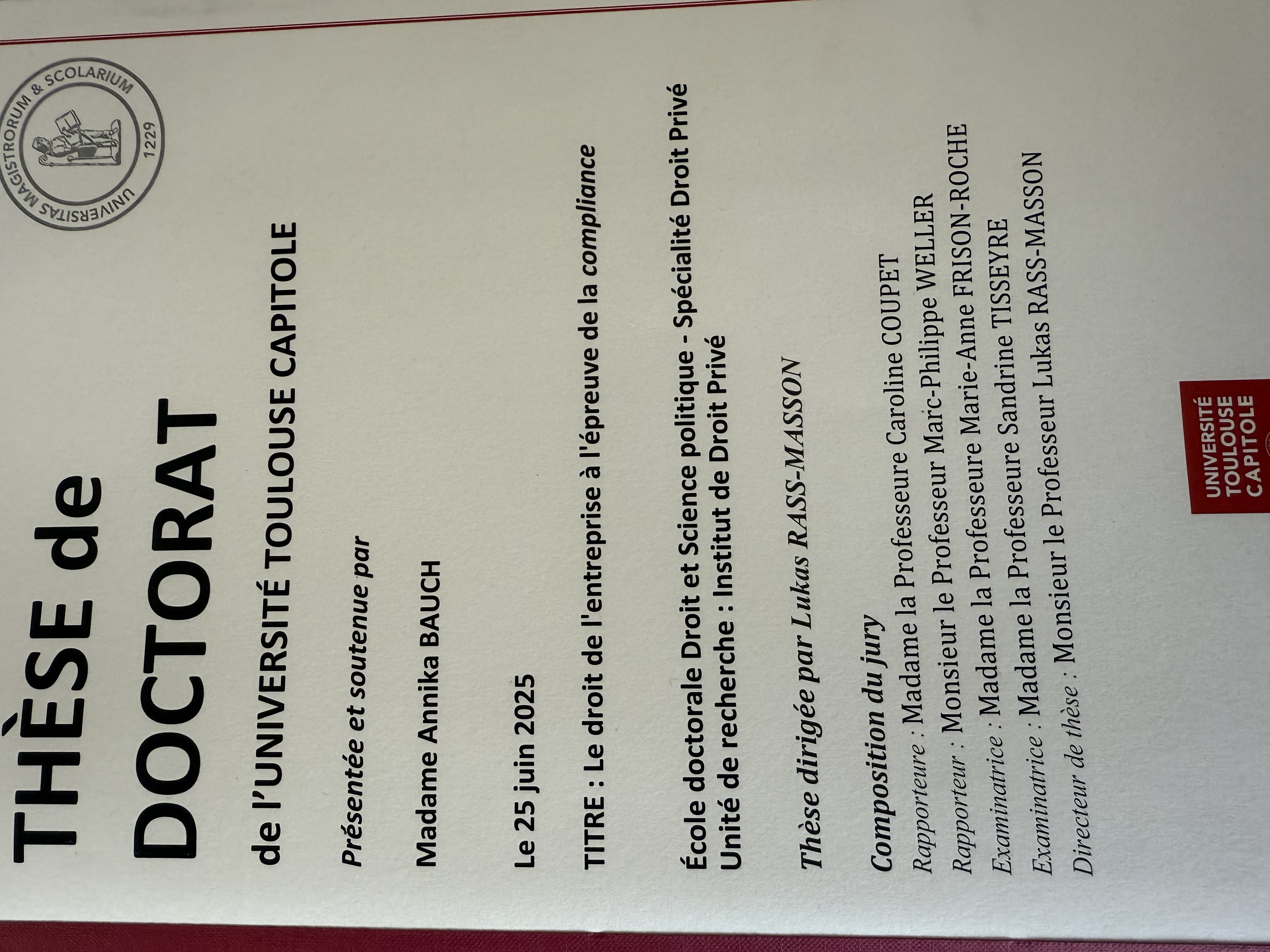
May 7, 2025
Thesaurus : Doctrine
► Référence complète : J.-L. Halpérin et A.D. Kessler, Les échanges en matière de droit pénal entre les Etats-Unis et l'Europe / Transatlantic Engagement with Criminal Law, Clio Thémis, Open Edition, mai. 2025, en numérique et accès libre.
____
____
► sommaire :
-
Jean-Louis Halpérin et Amalia D. KesslerIntroduction [Texte intégral]
-
Jean-Louis Halpérin
-
Sylvia Kesper-Biermann
-
Amalia D. Kessler
-
Luigi Lacchè
-
Aniceto Masferrer
________
April 30, 2025
Thesaurus : Doctrine

► Full Reference: A. Nicollet, "La charge du devoir de vigilance sur les entreprises s'inscrivant dans les chaines de valeur(The burden of Vigilance Duty on companies in value chains)", in M.-A. Frison-Roche (ed.), L'Obligation de Compliance, Journal of Regulation & Compliance (JoRC) and Dalloz, coll. "Régulations & Compliance", 2025, to be published.
____
📕read a general presentation of the book, L'Obligation de Compliance, in which this article is published
____
► English summary of this contribution : This article identifies the factors that lead to companies being held liable under the Vigilance Duty for which they are responsible. The first element is the notion of "chain", a new concept for the Law that has been incorporated into the legal system (I). This may be explicit or implicit, referring to the value chain, the activity chain or the supply chain. These vocabulary variations, depending on the texts and national laws, are aimed at cases where there is no overlap, but the duty of vigilance is transparently aimed at the value chain of which the others are part. The concept of the "chain" could therefore play an increasingly important role in Economic Law, in that it is its very existence that gives rise to a duty of vigilance on the part of the company that governs the structure of the chain.
The second part of the article shows that this Vigilance Duty places a shared burden on the companies in the chain. Indeed, while the company that is the master, either through corporate techniques or because it governs the structure of the chain more factually, must always fulfill this obligation, the companies along the chain cannot be relieved of it. The burden is cumulative, as stated in German legal system, but this principle should be generalised: performance may be joint, articulated, and performance by one may presume performance by the other, the obligation of the other may be performed by the other, but this does not amount to exemption. This concept allows for a global group policy without destroying the effectiveness of the Compliance Obligation.
Indeed, and this is the third part of the article, Liability is cumulative. The master company's liability is personal and it must not be able to shirk it. The companies in the value chain, while benefiting from a presumption of conformity by the very fact of the chain phenomenon and the multiple contracts and corporate shareholdings that structure it, are also liable if they fail in their Duty of Vigilance. National legislation varies widely in terms of the extent of liability incurred, with some not addressing the issue at all while others go into great detail, but they are not intended to call this principle into question.
________
April 8, 2025
Conferences
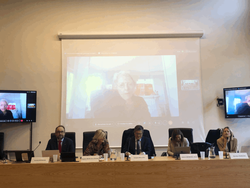
🌐suivre Marie-Anne Frison-Roche sur LinkedIn
🌐s'abonner à la Newsletter MAFR Regulation, Compliance, Law
🌐s'abonner à la Newsletter en vidéo MAFR Surplomb
🌐s'abonner à la Newsletter MaFR Droit & Art
____
► Référence complète : M.-A. Frison-Roche, "Traduire dans l'institution judiciaire l'articulation entre l'international et le systémique" in CREDIP, Faculté de Droit de l'Université Jean Moulin - Lyon 3, Le contentieux systémique émergent, un contentieux international justifiant la création de juridictions spécialisées, cycle de conférences sur Le contentieux international et la spécialisation des juges, Lyon , 18 avril 2025, 10h-12h.
____
🪑🪑🪑Participent aussi à cette manifestation :
🪑Jacques Boulard, Premier président de la Cour d'appel de Paris
🪑Brigitte Brun-Lallemand, Première présidente de chambre de la Cour d'appel de Paris (Pôle économique)
🪑Jérémy Heymann, professeur de droit à l'Université Jean Moulin - Lyon 3
🪑Sabine Abravanel-Jolly, Professeure de droit au sein de l'Equipe Louis Josserand
🪑Marylou Françoise, maîtresse de conférences à l'Université Jean Moulin - Lyon 3
____
🧮consulter le programme complet de cette manifestation
____
► Résumé de l'intervention : cette intervention ayant eu lieu après les présentations du Premier Président Jacques Boulard et Madame la Première Présidente Brigitte Brun-Lallemand, elle s'articule sur ces deux interventions.
I. Contentieux systémique et Contentieux international. On peut ainsi se demander si la nature d'un "contentieux systémique" se prête à ce qu'est un "contentieux international" ? A première vue, non. L'on pourrait poser que, d'une part, si le "contentieux systémique émergent" était "nécessairement international", alors l'on ne comprendrait pas pourquoi la Chambre spéciale internationale de la Cour d'appel de Paris ne suffisait pas et d'autre part, l'on ne comprendrait pas comment deux jugements ont été rendus sur le Devoir de Vigilance, dont on ne conteste pas qu'il appartient au Contentieux Systémique Emergent, alors qu'ils ne portent pas sur une chaine internationale de valeur : jugement TJ Paris 5 décembre 2023 dit La Poste, cas systémique actuellement devant la chambre spécialisée de la Cour d'appel de Paris ; TJ Paris 13 février 2025, dit SNCF, cas systémique, n'ayant pas fait l'objet d'appel.
II. Deux chambres spécialisées en miroir Dès lors, l'on pourrait dire que le contentieux systémique est de fait international mais pas par nature. Parce que cela n'est pas une subdivision du contentieux international, cela explique certes que la chambre 5-12 soit autonome par rapport à la chambre 5-16 (chambre internationale), mais parce que la perspective est de fait souvent transnationale, ces 2 chambres ont vocation à fonctionner en miroir. Car le système est un fait global. Et c'est plus en terme de fait global qu'il convient de le traiter, ce qui est plus facile dans des systèmes qui ne sont pas construit sur cette summa divisio du fait et du droit, qui convient mal au contentieux systémique.
III. Par nature, un contentieux dans lequel un système est "impliqué". Cela nous amène donc vers la définition du "Contentieux Systémique Emergent". Elle est simple : c'est un Cause dans laquelle un système est impliqué, dans lequel les intérêts de celui-ci sont en jeu, le premier de ses intérêts étant sa survie. C'est pourquoi la durabilité est une notion-clé, que l'on retrouve quelque soit le système impliqué. C'est pourquoi l'avenir est présent dans le contentieux systémique. C'est pourquoi l'office du juge est renouvelé car il s'agit d'un office Ex Ante, renouvellement à la fois procédural et substantiel qui conduit en pratique à un Droit processuel. Le fait systémique mène donc de droit à une dialogue des juges qui se spécialisent sur des faits globaux et les obligent, sauf à méconnaître ceux-ci, à se prendre en considération. Cela donne un nouveau statut au "droit comparé".
IV. Un contentieux émergent par le fait de systèmes nouveaux, globaux, saisis par des opérateurs locaux qui en fixent la stratégie. Les systèmes ont déjà donné lieu à des contentieux : c'est la juridictionnalisation du Droit de la Régulation. Mais la Régulation a quitté ce prérequis des systèmes pour entrer à l'intérieur des opérateurs économiques dont le pouvoir de stratégie est situé localement. Le Droit de la Compliance internalise les besoins systémiques. Le Droit de la Compliance dont on affirma, parce qu'Ex Ante, qu'il allait dispenser du Juge, s'est lui-même juridictionnalisé. L'obligation de vigilance étant elle-même la pointe avancée de la Compliance, ne pouvait que donner une large place au Juge. Tandis que le système est l'enjeu du procès et de sa bonne solution, la partie au litige est l'opérateur cruciale : non seulement les entreprises régulées (comme les banques) mais encore les entreprises maîtresses des chaines de valeur (ce qui fait sortir le Droit de la Régulation des secteurs régulés). Or, les chaines de valeur sont un espace global contractuellement structuré transnational rattachées à un juge local qui est confronté à un office renouvelé avec le DIP.
V. Une culture juridictionnelle propre à des zones distinctes. Le Droit de la Vigilance, de la Compliance et de la Régulation tel qu'on le voit manier par les juges dépasse nos distinctions entre droit public et droit privé, entre les systèmes juridique, mais les décisions que l'on lit expriment trois cultures, procédurales et substantielles, différentes : l'Asie, les Etats-Unis et l'Europe. Cette culture de place porteuse d'une identité européenne de Vigilance, de Compliance et de Régulation repose notamment sur une culture juridictionnelle propre à cette zone-là.
________
Sept. 5, 2024
Thesaurus : Doctrine
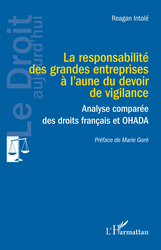
► Référence complète : R. Intolé, La responsabilité des grandes entreprises à l’aune du devoir de vigilance. Analyse comparée des droits français et OHADA, préf. M. Goré, L'Harmattan, coll. "Le Droit aujourd'hui", 2024, 412 p.
____
____
📗lire la table des matières de l'ouvrage
____
► Résumé de l'ouvrage (fait par l'éditeur) : "Le devoir de vigilance prône la responsabilisation des grandes entreprises en matière sociétale et environnementale. En permettant l’appréhension des grandes entreprises et de leurs réseaux dans leur ensemble, il incite toute l’organisation à agir globalement de manière responsable.
L’analyse du devoir de vigilance en droit français fait ressortir que ce dernier s’écarte des solutions classiques du droit de la responsabilité, et cela à au moins deux points de vue. Les normes applicables au devoir de vigilance privilégient une approche fondée sur l’auto-contrôle autonome des entreprises plutôt que sur la répression. En même temps, le devoir de vigilance apporte une logique de contrainte entraînant plus spécifiquement une nouvelle construction du droit de la responsabilité fondée sur la prévention, qualifiée de responsabilité-anticipation.
Il est alors proposé la transposition de ces pratiques qui ont pénétré le droit français en droit de l’OHADA."
________
March 26, 2024
Thesaurus : Doctrine
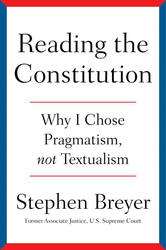
► Full reference : S.Breyer, Reading the Constitution: Why I Chose Pragmatism, Not Textualism, Simon & Schuster, 2024, 361 p.
____
📗read the 4th cover page
____
📗read the book's table of contents
____
► Book summary (by the publisher) : "A provocative, brilliant analysis by recently retired Supreme Court Justice Stephen Breyer that deconstructs the textualist philosophy of the current Supreme Court’s supermajority and makes the case for a better way to interpret the Constitution.
“You will not read a more important legal work this election year.” —Bob Woodward, Washington Post reporter and author of fifteen New York Times bestselling books
“A dissent for the ages.” —The Washington Post
“Breyer’s candor about the state of the court is refreshing and much needed.” —The Boston Globe
The relatively new judicial philosophy of textualism dominates the Supreme Court. Textualists claim that the right way to interpret the Constitution and statutes is to read the text carefully and examine the language as it was understood at the time the documents were written.
This, however, is not Justice Breyer’s philosophy nor has it been the traditional way to interpret the Constitution since the time of Chief Justice John Marshall. Justice Breyer recalls Marshall’s exhortation that the Constitution must be a workable set of principles to be interpreted by subsequent generations.
Most important in interpreting law, says Breyer, is to understand the purposes of statutes as well as the consequences of deciding a case one way or another. He illustrates these principles by examining some of the most important cases in the nation’s history, among them the Dobbs and Bruen decisions from 2022 that he argues were wrongly decided and have led to harmful results."
________
Jan. 17, 2024
Thesaurus : Doctrine

► Référence complète : S. L. Dreyfuss, "La lutte anti-corruption : l’emprunt au modèle américain et à ses récentes évolutions", in M.-A. Frison-Roche et M. Boissavy (dir.), Compliance et droits de la défense. Enquête interne – CJIP – CRPC, Journal of Regulation & Compliance (JoRC) et Dalloz, coll. "Régulations & Compliance", à paraître.
____
📕consulter une présentation générale de l'ouvrage, Compliance et droits de la défense - Enquête interne, CIIP, CRPC, dans lequel cet article est publié
____
► Résumé de l'article (fait par le Journal of Regulation & Compliance - JoRC) : S'appuyant sur la pertinence d'une attention toute particulière à porter sur les mécanismes américains, puisqu'ils inspirent tant les législateurs européen et français, par exemple entre le DPA et la CJIP, l'auteur décrit les caractéristiques du nouveau dispositif mis en place en 2022 et 2023 par le DoJ : la Declination et la Presumption of Declination.
Sans plus requérir ni l'autorisation ni l'homologation d'un juge, le DoJ accorde le bénéfice de la garantie de ne pas poursuite, garantie apportée à l'entreprise par ce que l'auteur présente comme un "contrat", en échange de quoi l'entreprise apporte sa pleine collaboration, notamment toutes les preuves dont elle dispose, en premier lieu contre elle-même.
Contrairement à la France où l'enquête est menée par l'entreprise elle-même, il s'agit pour le DoJ d'alimenter ainsi l'enquête qu'elle dirige et dont elle conserve la pleine maîtrise, ayant par ailleurs les moyens matériels et humains de la mener.
____
🦉Cet article est accessible en texte intégral pour les personnes inscrites aux enseignements de la Professeure Marie-Anne Frison-Roche
________
Jan. 17, 2024
Thesaurus : Doctrine

► Référence complète : V. Chatelin, "Enquêtes internes, enquêtes pénales et droits de la défense : que nous disent les jurisprudences américaine et anglaise (l’affaire Connolly et l’affaire ENRC) ?", in M.-A. Frison-Roche et M. Boissavy (dir.), Compliance et droits de la défense. Enquête interne – CJIP – CRPC, Journal of Regulation & Compliance (JoRC) et Dalloz, coll. "Régulations & Compliance", à paraître.
____
📕consulter une présentation générale de l'ouvrage, Compliance et droits de la défense - Enquête interne, CIIP, CRPC, dans lequel cet article est publié
____
► Résumé de l'article (fait par le Journal of Regulation & Compliance - JoRC) : L'article justifie l'objet pris de case law américain et britannique en ce que les enquêtes internes y sont une pratique plus ancienne et que des cas montrent que lorsqu'elles sont menées en lien avec les autorités, aux Etats-Unis, le DoJ, au Royaume-Unis, le SFO, elles peuvent mettre en danger les droits de la défense de ceux qui y sont entendus, puis les liens entre l'entreprise qui collabore à tort et le cabinet d'avocat qui y a aidé.
Pour appuyer cela, l'article décrit en détail les cas américains Gavin, Coburn & Schwart, Tournant , puis le cas britannique ENRC, qui a donné lieu à plusieurs décisions au Royaume-Uni illustre les dangers que fait courir le non-respect du secret professionnel par des avocats chargés de l’enquête interne.'
____
🦉Cet article est accessible en texte intégral pour les personnes inscrites aux enseignements de la Professeure Marie-Anne Frison-Roche
________
June 21, 2023
Conferences
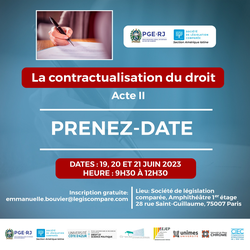
♾️follow Marie-Anne Frison-Roche on LinkedIn
♾️subscribe to the Newsletter MAFR Regulation, Compliance, Law
____
► Full Reference: M.-A. Frison-Roche, "Favoriser ou pas la « contractualisation » du Droit" ("To favour or not the "contractualisation" of the Law"), final speech in Société de législation comparée (SLC) and Procuradoria Geral do Estado do Rio de Janeiro (PGE-RJ), La contractualisation du droit. Acte II, Paris, 21 June 2023.
____
🧮See the full programme of this event (in French).
The conference is held in French
________
May 11, 2023
Thesaurus : Soft Law
► Full Reference : Agence française anticorruption - AFA (French Anticoruption Agency), Presentation of various regulatory frameworks for promoting business integrity across the world, Study, May 2023.
____
________
Jan. 25, 2022
Thesaurus : Doctrine
► Référence complète : Feeley, M. et Langford, M. (ed), The Limits of the Legal Complex Nordic Lawyers and Political Liberalism (ed), Oxford University Press, 2022.
____
📗Cet ouvrage peut être consulté en libre accès sur le site de l'éditeur.
Jan. 18, 2022
Thesaurus : Doctrine
► Référence complète : A. Mbengue, "L’amicus curiae devant la Cour suprême des États-Unis", La Revue des Droits de l'Homme, in dossier "Les interprétations concurrentes de la Constitution, III- Interprétations concurrentes et observateurs, janvier 2022, n°21, pp. 1-14
____
► Résumé de l'article (fait par l'auteure) : "L’amicus curiae permet l’intervention des entités défendant des intérêts privés dans le contrôle de constitutionnalité opéré par la Cour suprême des États-Unis. La figure moderne de l’amicus curiae a créé une concurrence entre un intérêt public tel qu’il est conçu par les entités privées avec l’intérêt public tel qu’il est défendu par les organes gouvernementaux. Cela a conduit le juge constitutionnel américain à objectiver les données comprises dans les mémoires des personnes privées dans son interprétation de la Constitution par des méthodes d’appropriation des interprétations concurrentes. Cette appropriation met donc fin à la conception monopolistique de défense de l’intérêt public par les organes gouvernementaux et érige les entités privées comme des experts factuels des questions constitutionnelles. Ainsi, davantage qu’il est un élément procédural, l’amicus curiae est porteur d’une logique politique éminente dans le contrôle de constitutionnalité aux États-Unis.".
____
🦉Cet article est accessible en texte intégral pour les personnes inscrites aux enseignements de la Professeure Marie-Anne Frison-Roche
________
Sept. 8, 2021
Thesaurus : Doctrine
► Référence complète : G. Davy, "Le mythe des lois de saint Óláf et l’invention des loisfondamentales dans la Norvège médiévale", Cahiers de civilisation médiévale 2021/3 n° 255, pp.197-210, Éditions Université de Poitiers.
____
🦉Cet article est accessible en texte intégrale pour les personnes qui suivent les enseignements du professeure Marie-Anne Frison-Roche.
________
Sept. 2, 2021
Interviews

► Référence complète : Frison-Roche, M.-A.,La nouvelle loi de protection des données en Chine est un « anti-RGPD », entretien avec Olivia Dufour, Actu-Juridique, 2 septembre 2021.
____
Les 3 questions posées étaient :
❓ La Chine a adopté fin août une grande loi de protection des données personnelles. Celle-ci est présenté dans les médias comme un équivalent de notre RGPD. Est-ce le cas ?
La réponse est : non.
(lire la réponse développée dans l'entretien)
____
❓ S'agit-il de simples effets indésirables ou bien du but poursuivi par le Législateur ?
La réponse est : Le but du Législateur n'est pas d'armer l'individu contre le pouvoir de l'Etat, c'est au contraire d'accroître le pouvoir de l'Etat, éventuellement contre lui.
(lire la réponse développée dans l'entretien)
____
❓ Si la compliance peut servir les intérêts d'Etats non-démocratiques, c'est donc qu'elle est potentiellement dangereuse ?
La réponse est : elle n'est dangereuse que définie comme "méthode d'efficacité des règles ; il faut définir le Droit de la Compliance par son "but monumental" qui est la protection des personnes. La contradiction de la loi chinoise nouvelle apparaît alors.
(lire la réponse développée dans l'entretien)
____
June 16, 2021
Compliance: at the moment

► Compliance Law is essential for the future of Africa: this is also a lesson from the Juin 2021 G7 Summit in its Infrastructure Plan.
It emerges from the G7 summit which ends on June 13, 2021 in Carbis Bay in the United Kingdom, a common desire to increase infrastructures in Africa, in itself and because otherwise China will do it, and will do it differently.
Compliance Law will be determinant in this common action for three reasons.
First and because the issue is about infrastructures, the construction and the management of infrastructures falling more under Regulatory Law than Competition Law (📕Chevalier, J.-M., Frison-Roche, M.-A, Keppler, J.EPPLER, J.H. et Noumba, P. (ed.), Économie et droit de la régulation des infrastructures. Perspectives des pays en voie de développement, 2009). However, Compliance Law is not a simple process for the effectiveness of rules which are external to it, it is the extension in companies of Regulatory Law. Where companies must implement regulatory goals within themselves, they develop Compliance rules (➡️📝see Frison-Roche, M.A., From Regulation Law to Compliance Law, 2017.
Secondly and because the issue is about Africa, the Rule of Law is sometimes not very solid there. By internalizing Regulatory Law in companies (or even by associating Arbitration with it), Compliance Law makes it possible to get out of this dead end (➡️📝Salah, MM, Conception and Application of Compliance in Africa, in 📕 Frison-Roche, M.-A. (ed.), Compliance Tools, 2021.
Thirdly and because the topic si about China, Compliance Law in its European conception has the Monumental Goal of defending individuals while in its Chinese conception it aims to obtain their obedience to the rules (➡️📝Frison-Roche, M.-A., In China, Compliance Law deploys without, and even against democracy, China seeing Compliance only as an "efficiency process"; in Europe, it deploys with and even for democracy, 2021). On construction sites and in the human management of infrastructures, this changes everything.
G7 members share the first conception.
They must now implement it by their companies and thanks to them, private sector being in alliance with the political authorities which just expressed. Because Compliance Law is an alliance between political authorities and crucial economic operators.
June 17, 2020
Thesaurus : Doctrine
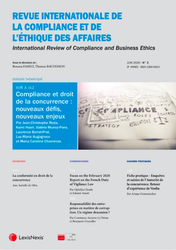
Full reference: Salah, M. M., The Legal Framework for New Silk Roads: a Globalized Law at the Service of a Global ambition. When China Discovers the Virtues of Globalization of Law, International Business Law Journal, n°3, 2020, p. 319-351
This article is available for Sciences Po's students via the Drive in the folder MAFR Regulation et Compliance
May 28, 2020
Publications
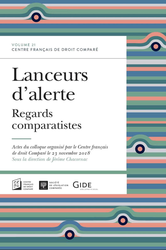
Full reference: Frison-Roche, M.-A., L'impossible unicité juridique de la catégorie des "lanceurs d'alertes" ("The impossible legal unicity of the category of "whistleblowers""), in Chacornac, J. (dir.), Lanceurs d'alertes, regards comparatistes, ("Whistleblowers, comparative perspectives"), Publications of the Centre français de droit comparé ("French Comparative Law Center"), May 2020, Volume 21, p.13-31.
Read the article (in French).
Read the general presentation of the collective book in which this article is published
Read the bilingual working paper which had served of basis for this article.
Read the presentation of the conference "Les lanceurs d'alertes: glose" (Whistleblowers: glose") and especially the slides elabored for the colloquium organized by the Centre français de droit comparé ("French Comparative Law Center") on 23th of November 2018 under the direction of Jérôme Chacornac
____
Introduction of the article
"Whistleblowers". This is a new expression. Which is a great success. Barely heard once, we hear it everywhere ...
A topic not of course or knowledge test, but rather a topic of daily conversation. Because it is spoken to us every day, in more or less gracious terms. For example President Donald Trump on October 1, 2019 declared to the press "want to question" the whistleblower who would have illegally denounced him and would not, according to him, have the right to conceal his identity, proof in this according to him of the lying character of his assertions against him, while his lawyer indicates on October 6, 2019 that he is not speaking on behalf of a single whistleblower thus taken to task but of a plurality of people who gave information against the President of the United States. Even the most imaginative screenwriters would not have written such brutal and rapid twists and turns. Spectators, we are waiting for the next episode, secretly hoping for the escalation.
And precisely if we go to the cinema, it is still a whistleblower whose dedication and success, we are told about, even the drama, for the benefit of global society, and in particular democracy, since the secrets are fought for the benefit of the truth. The Secret Man designates Mark Felt as the first whistleblower. Returning to what we often present as being a more "serious" media!footnote-1391, we listen to France-Culture and here is another story told by a historian who worked as an archivist on events that political power would have liked to keep hidden by possibly destroying their traces but which its trade led to preserve: here it is expressly presented to the studious listeners like a "whistleblower" .... While the same radio tries to find the one who could well be, as in a kind of contest the "first whistleblower"!footnote-1727? .... This rewriting of History can be defended because ultimately what did other Voltaire do for Calas, or Zola for Dreyfus?
It is also a subject of legislative discussion since in the United States the Dodd-Frank law of 2010 inserted in the law of 1934 which established the Securities & Exchanges Commission a complete device of remuneration and remuneration of the whistleblowers, whereas after having developed flexible but guiding lines in this regard in 2012!footnote-1698, the European Commission published on November 20, 2018 the text of what will become a Directive intended to give a unified European status to the character, in the system gradually developed to protect the one who was presented in 2018 as that "cannot be punished for having done what is right".
In Europe, the Directive first approved by a Resolution of the European Parliament on April 16, 2019 on the protection of persons denouncing breaches of Union Law and then adopted on October 7, 2019 (Directive of the European Parliament and of the Council of European Union on the Protection of Persons who Report Violations of European Union Law, different title, it should be noted, will have to be transposed into the laws of the Member States within the next two years. , since only "violations of Union Law" are targeted, but the character of the "whistleblower" is more generally targeted: he is "whole"!footnote-1699.
In short, the whistleblower is a star!footnote-1390. A sort of historical figure, covered in blows and glory, going from Voltaire to Snowden, both of whom find themselves embodied on the screens!footnote-1681 ....,
Consecrated by law, which associates with it a legal regime of protection to such an extent that, like a Nessus tunic, it is this legal regime which will define the character and not the reverse. When we read the law of December 9, 2016 relating to transparency in the fight against corruption and the modernization of economic life, known as "Sapin 2", we notice that the Legislator makes much of this character, since 'he dedicates its chapter II to him!footnote-1682: "From the protection of whistleblowers", and that it is by his very protection that he formally opens the door of Right to him.
But why a plural? Admittedly when we read the recitals of the Community Directive of October 7, 2019 on the protection of whistleblowers!footnote-1702, it is only a list of all the subjects on which it is a good idea to protect them, which therefore prompts us to see in this plural only the index of this non-exhaustive list of subjects which it is good to tell us, a sign of the lack of definition of who should alert us. Reading the French law known as "Sapin 2" makes it less severe but more perplexing. Indeed, this plurality referred to by the title of the chapter devoted to "whistleblowers", there is no longer any question in the rest of the law, in the very definition which follows, article 6 which opens this chapter devoted to "whistleblowers" offering the reader immediately a singular since it begins as follows: "A!footnote-1684 whistleblower is a person ...". No mention of diversity. The art of legislative writing would however have required that the qualifying article not only be singular but that it should not yet be undefined. Stendhal if he had still deigned to have the law for bedside book would have wanted to find at the beginning of chapter a sentence like: "The!footnote-1683 whistleblower is a person ...".
Thus seem to contradict themselves within the law "Sapin 2 the very title which presents the character, in that it uses a defined plural (the) while the defining article which presents it is in the undefined singular (one). ...
Here is a first reason not to advance any more but in a very careful way, in this "step by step" that constitutes a reading word for word: a gloss. This consists of taking the expression itself literally. The second reason for this technical choice is that the gloss is well suited to the introduction of a collective work, thus allowing more targeted developments to take place in other contributions, on the techniques, the difficulties and the limits of this protection, or on its history, or the reasons for the arrival in French law of these whistleblowers and the way they develop, or not, elsewhere.
I am therefore going to content myself with taking this already legal expression to the letter: The (I) whistle (III). blowers (II).
April 15, 2020
Thesaurus : Doctrine
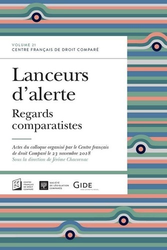
Full reference: Chacornac, J. (ed.), Lanceurs d'alerte: regards comparatistes (written in French), Editions de la Société de Législation Comparée, Vol. 21, avril 2020, 192 p.
This book follows the conference organized by the Centre français de droit Comparé on 23rd of November 2018
Read the fourth of cover (in French)
Read the table of contents (in French)
Read the presentation of Marie-Anne Frison-Roche's article: L'impossible unicité de la catégorie des lanceurs d'alerte, which is the introduction of the book
_____
Jan. 23, 2020
Thesaurus : Doctrine

► Référence complète : W. Marx, "Vivre dans la bibliothèque du monde", Leçon inaugurale pour la Chaire de Littérature comparé au Collège de France, 23 janvier 2020.
____
📻Ecouter un entretien à propos de ce cours, centré sur la notion de "bibliothèque mentale" :
____
► Présentation de la conférence (faite par le Collège de France) : L’étude de la littérature est affaire de science, mais aussi, et sans doute d’abord, de plaisir. Or le plaisir peut faire obstacle à une approche scientifique de la littérature. Heureusement, une étude comparée de la littérature permet de dépayser notre rapport à la littérature en remettant en question nos habitudes de lecture ainsi que les canons sur lesquels se fonde notre conception de l’objet littéraire. Elle permet de renouveler notre compréhension des œuvres, dans la mesure où toute lecture est, de manière inconsciente, une lecture comparée : une œuvre fait sens sur un fond d’autres œuvres dont elle se détache, tant et si bien que changer l’arrière-plan revient également à modifier la perception du premier plan. Un tel décentrement n’est cependant pas facile à obtenir : il exige une transformation quasiment existentielle du lecteur lui-même, appelé à renoncer à l’idée beaucoup trop nivelante de littérature mondiale, pur produit de l’émergence du concept moderne de littérature à la fin du XVIIIe siècle, afin de parvenir à entrer dans un autre univers, celui de la bibliothèque du monde, infiniment plus respectueuse de la singularité des objets qui la composent, et donc plus propre à provoquer la défamiliarisation indispensable. Une approche comparatiste doit se frayer un chemin étroit entre, d’une part, cette nécessaire sensibilité à l’altérité et, d’autre part, les forces aujourd’hui toujours plus puissantes qui visent à rendre les cultures hermétiques les unes aux autres en insistant sur une prétendue incommunicabilité des objets culturels.
.....
À quelle échelle en effet envisager un problème quelconque de l’histoire littéraire ? L’échelle européenne vaut pour un grand nombre de sujets intéressant la littérature française. Mais de quelle Europe s’agira-t-il ? Une définition large s’impose, intégrant les littératures des langues européennes, de quelque continent qu’elles viennent, et notamment des Amériques. Mais pourquoi s’arrêter là ? Dès l’Antiquité classique, les échanges méditerranéens et eurasiens mirent en contact les cultures européennes avec l’Afrique et l’Asie, et ils ne cessèrent de se complexifier, en particulier avec les mouvements de colonisation, puis de décolonisation. La perméabilité des cultures et la circulation des œuvres forment une donnée fondamentale de leur histoire.
La notion même de littérature fait cependant problème, avec tout ce qu’elle implique de présupposés et d’usages historiquement datés et géographiquement localisés : en gros, l’Europe des deux derniers siècles. C’est pourquoi l’intitulé de cette chaire a été mis au pluriel, et il y est proposé l’étude non pas de la, mais des littératures, dont il convient de postuler d’abord la diversité, non seulement linguistique, mais culturelle et anthropologique. Il s’agira d’explorer une problématique, celle de la pluralité des objets dits littéraires, de leur nature, des corpus qu’ils forment, de leurs fonctions et de leur variabilité historique et culturelle.
En travaillant à une histoire et à une géographie différentielles du concept de littérature, on visera à provoquer chez le lecteur contemporain un sentiment d’étrangeté par rapport à lui-même, à déstabiliser ses systèmes de valeurs et sa vision du monde : non pas le simple dépaysement pour le dépaysement, mais un dépaysement visant à la défamiliarisation.
Une telle réflexion sur les cultures dans lesquelles s’inscrivent les textes finit forcément par déboucher sur une critique générale de la culture, selon une mission de nature humaniste et démocratique. Dans l’Europe à laquelle nous participons désormais en tant que citoyens, dans le monde globalisé qui est le nôtre, où les progrès technologiques démultiplient les échanges et circulations des personnes, des discours, des représentations et des biens tout en aggravant le risque de malentendus culturels et religieux, cette mission subversive, critique et créatrice ne peut pas ne pas rester la note fondamentale, sinon la justification, de tout enseignement et de toute recherche en littératures comparées au Collège de France.
________

Updated: Oct. 25, 2017 (Initial publication: May 27, 2016)
Publications

► Full Reference: Frison-Roche, M.-A., Globalization from the point of view of Law, working paper, May 2017.
____
🎤 This working paper initially served as a basis for a synthesis report made in French in the colloquium organized by the Association Henri Capitant in the International German Days on the subject of "Le Droit et la Mondialisation" (Law and Globalization).
📝 Il sert dans un second temps de base à l'article paru dans l'ouvrage La Mondialisation.
📝 it serves as a second basis for the article (written in English, with a Spanish Summary) to be published in the Brezilian journal Rarb - Revista de Arbitragem e Mediação (Revue d`Arbitrage et Médiation).
It uses the Bilingual Dictionary of the Law of Regulation and Compliance.
____
► Summary of the Working: Globalization is a confusing phenomenon for the jurist. The first thing to do is to take its measure. Once it has been taken, it is essential that we allow ourselves to think of something about it, even if we have to think about it. For example, on whether the phenomenon is new or not, which allows a second assessment of what is taking place. If, in so far as the law can and must "pretend" to defend every being, a universal claim destined to face the global field of forces, the following question - but secondary - is formulated: quid facere? Nothing ? Next to nothing ? Or regulate? Or can we still claim that the Law fulfills its primary duty, which is to protect the weak, including the forces of globalization?
____
read the Working Paper below⤵️
July 4, 2017
Thesaurus : Doctrine
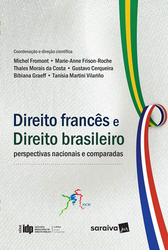
Référence complète : Fromont, M., et al. (dir.), Direito francês e Direito brasileiro perspectivas nacionais e comparadas, coll. "IDP", Saraiva, 2017, 1121 p.
Lire la quatrième de couverture.
Consulter la liste des contributions à l'ouvrage.
Sept. 17, 2015
Thesaurus : Doctrine
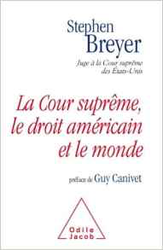
► Référence complète : Breyer, S., La Cour suprême, le droit américain et le monde, préface de Guy Canivet, éd. Odile Jacob, 2015.
____
► Lire la 4ième de couverture.
____
► Lire la préface de Guy Canivet.
____
Consulter la fiche sur l'ouvrage de Justice Breyer, La Cour suprême, l'Amérique et son histoire.
April 17, 2013
Thesaurus : Doctrine
Référence complète : Mignon-Colombet, A. et Buthiau, F., Le Deferred Prosecution Agreement américain, une forme inédite de justice négociée. Punir, surveiller, prévenir ? , JCP, éd. G., 2013, p.621-627.
____